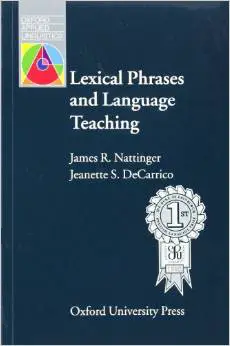Table of Contents
Introduction
“Lexical Phrases and Language Teaching” by James R. Nattinger and Jeanette S. DeCarrico is a seminal text in the field of applied linguistics and language pedagogy. First published in 1992, the book explores the role of lexical phrases in language acquisition and teaching, offering insights that continue to influence how educators approach second language instruction. This review delves into the book’s key themes, strengths, and practical applications for language teaching.
Lexical Phrases and Language Teaching: Overview

The authors argue that language is best understood as a series of lexical phrases—chunks or fixed expressions—rather than discrete words or grammar rules. Lexical phrases include collocations, idiomatic expressions, and formulaic sequences, all of which contribute to fluency and communicative competence. Nattinger and DeCarrico emphasize that teaching these phrases can help learners bridge the gap between grammatical accuracy and natural, fluent communication.
Key Themes and Concepts
- Lexical Phrases in Language Use The book highlights how native speakers rely heavily on lexical phrases in daily communication, making them essential for authentic language use. By focusing on these phrases, learners can acquire functional language that mirrors real-world use.
- Theoretical Framework Drawing on insights from cognitive linguistics and psycholinguistics, the authors present a framework for understanding how lexical phrases are stored and processed in the brain. They propose that these chunks serve as building blocks for language production and comprehension.
- Implications for Teaching Nattinger and DeCarrico advocate for integrating lexical phrases into all aspects of language teaching. They discuss techniques such as contextualized input, repetition, and activities that encourage students to notice and practice these phrases.
Strengths
- Groundbreaking Approach: The book’s focus on lexical phrases was ahead of its time, challenging the traditional grammar-centric methods of language teaching.
- Practical Examples: The authors provide numerous examples of lexical phrases and suggest activities to teach them, making the book a valuable resource for teachers.
- Interdisciplinary Insights: By incorporating findings from linguistics, psychology, and education, the book offers a comprehensive understanding of its subject.
Limitations
While “Lexical Phrases and Language Teaching” is highly influential, some of its ideas may feel dated in light of recent research. For example, advances in corpus linguistics have expanded our understanding of lexical phrases, and newer teaching technologies offer alternative ways to incorporate them into lessons. Additionally, the book’s theoretical focus may not resonate with educators seeking immediate, ready-to-implement strategies.
Practical Applications
For language teachers, the book provides a wealth of ideas for integrating lexical phrases into the curriculum. Activities such as:
- Creating lexical phrase banks for specific topics (e.g., travel, business English)
- Using dialogues and role-plays to practice formulaic expressions
- Employing corpora or authentic texts to identify and teach frequent phrases
can all enhance students’ ability to use language naturally and fluently.
Conclusion
“Lexical Phrases and Language Teaching” remains a cornerstone for understanding the importance of lexical chunks in language learning. While some aspects may benefit from updates, its core message—that lexical phrases are central to effective communication—is as relevant today as it was upon publication. This book offers theoretical insights and practical guidance to enrich the learning process for language teachers, researchers, and anyone interested in second language acquisition.
Get the book here: Lexical Phrases and Language Teaching (Oxford Applied Linguistics)


